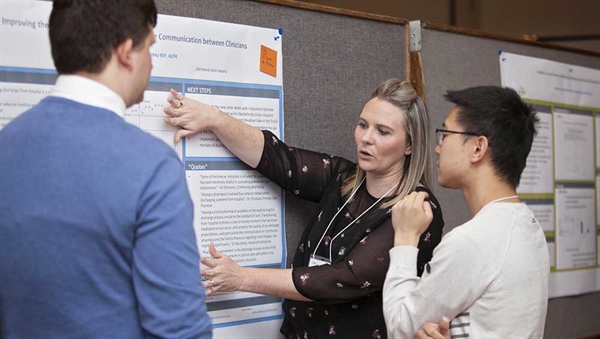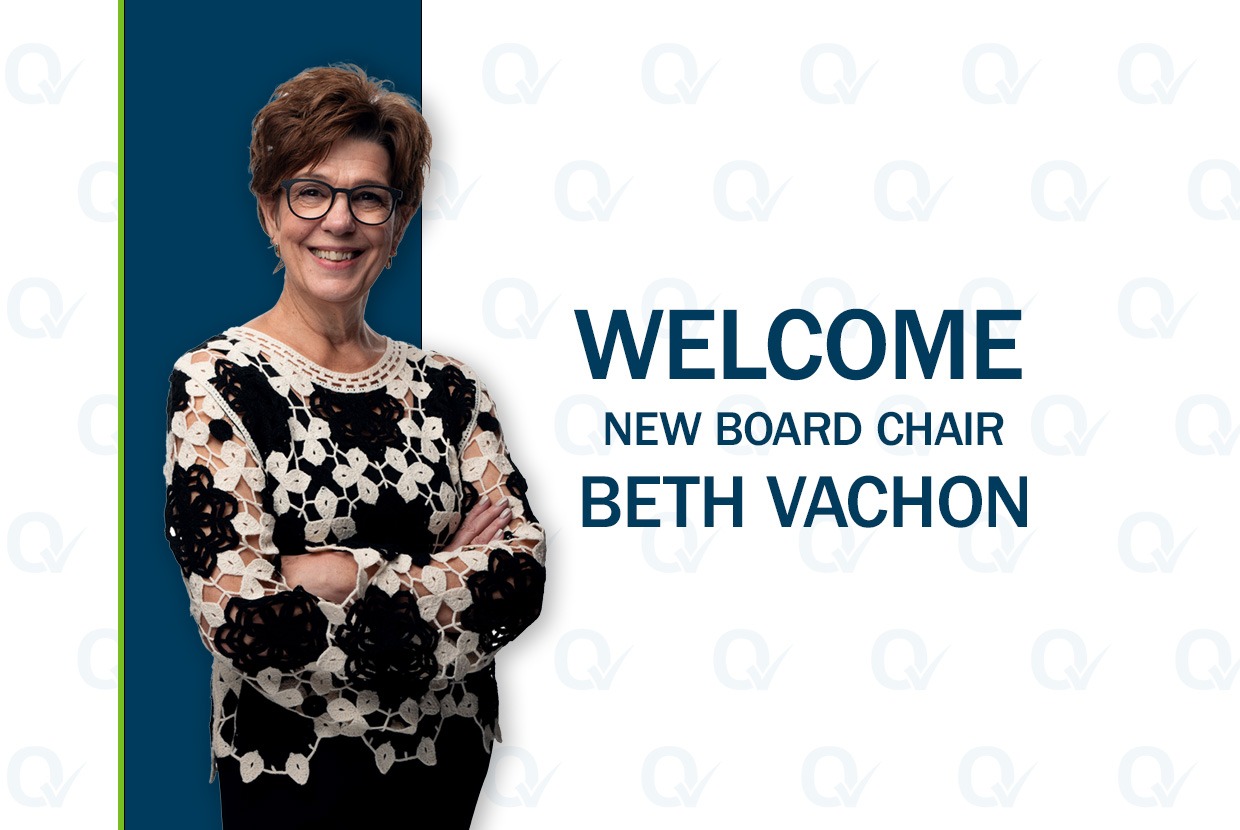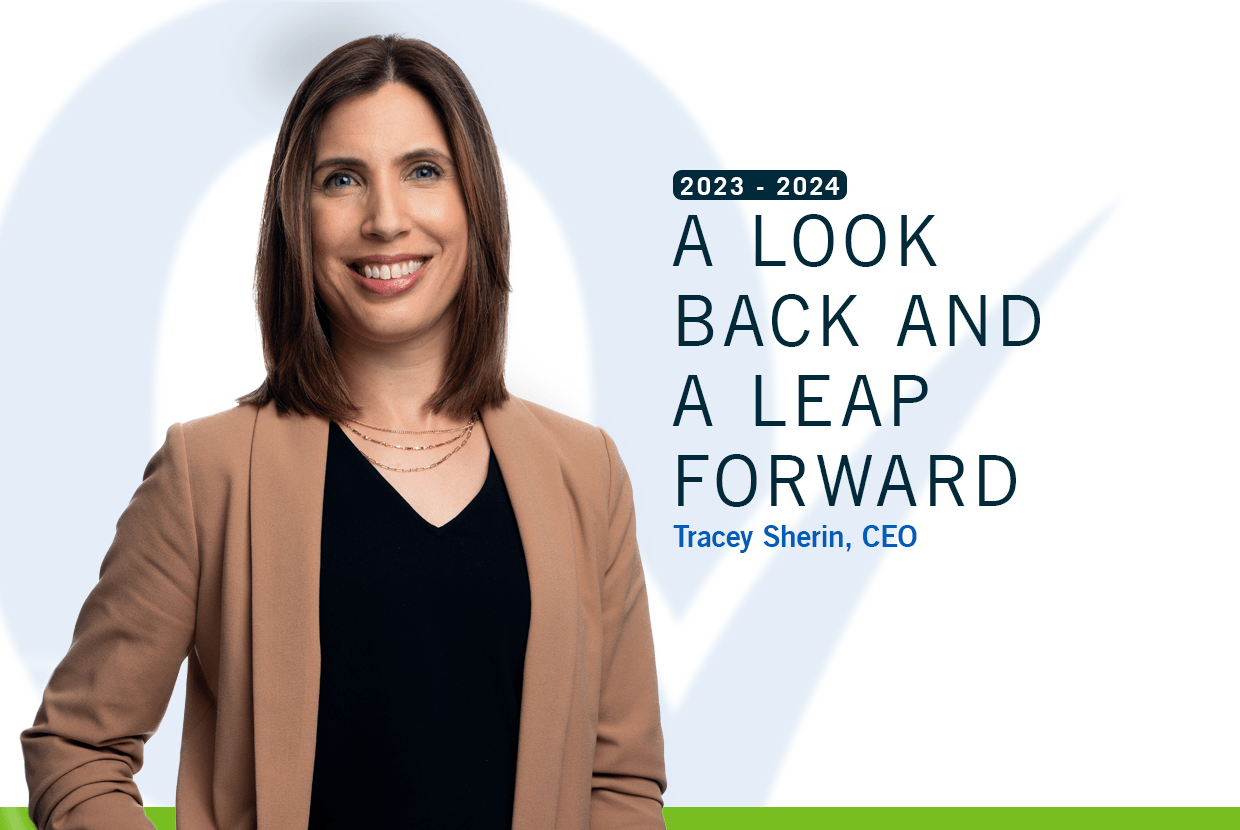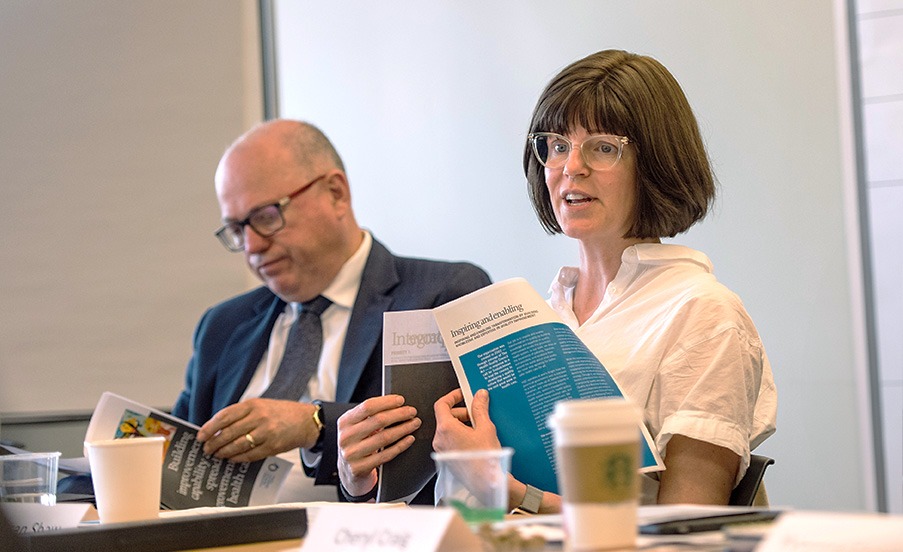Meet Saskatchewan’s QI Darling: CQIP
Clinical Quality Improvement Program (CQIP) is a 10-month course designed to build capability in leading improvement work in health care, with a focus on clinical quality improvement projects. The program, funded through a partnership between the Ministry of Health and the Saskatchewan Medical Association (SMA), includes a mix of theory and experiential learning along with individual coaching and a community of practice.
The CQIP Capstone Event
As a part of the course’s grande finale, participants present their final QI (quality improvement) project findings in a two-minute verbal presentation (also known as QIck Talks) and poster presentation at the capstone workshop.
On Sept. 7, 2018 graduates from CQIP’s second cohort shared what they learned through their QI projects and participation in the program:
Table of Contents (click on participants’ names to jump to their learnings)
Dr. Jeffrey Betcher, critical care physician, Regina
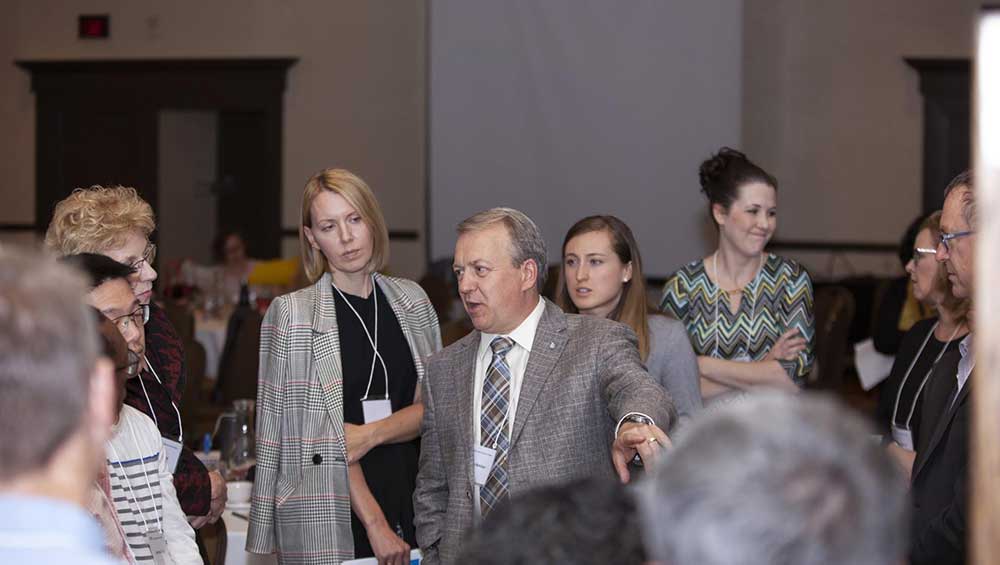
Dr. Betcher’s Quality Improvement Project
Direct From Positive Blood Culture Identification of Staphylococci
For his CQIP project, Dr. Betcher aimed to implement nucleic acid amplification testing to directly identify the presence of S. aureus and mecA resistance genes in positive blood cultures to allow for earlier targeted antimicrobial therapy.
Dr. Betcher’s QI Learning(s)
“QI is not clinical research. It’s just small numbers and small steps and the cumulative effect of those small steps really leads to improvement in QI and the success was that I could get this done in the short time that I did.
There will always be some resistance to change and you just have to fight to work through that.”
Check out Dr. Betcher’s QIck talk video and project poster.
Dr. Steven Bharadwaj, thoracic surgeon, Saskatoon
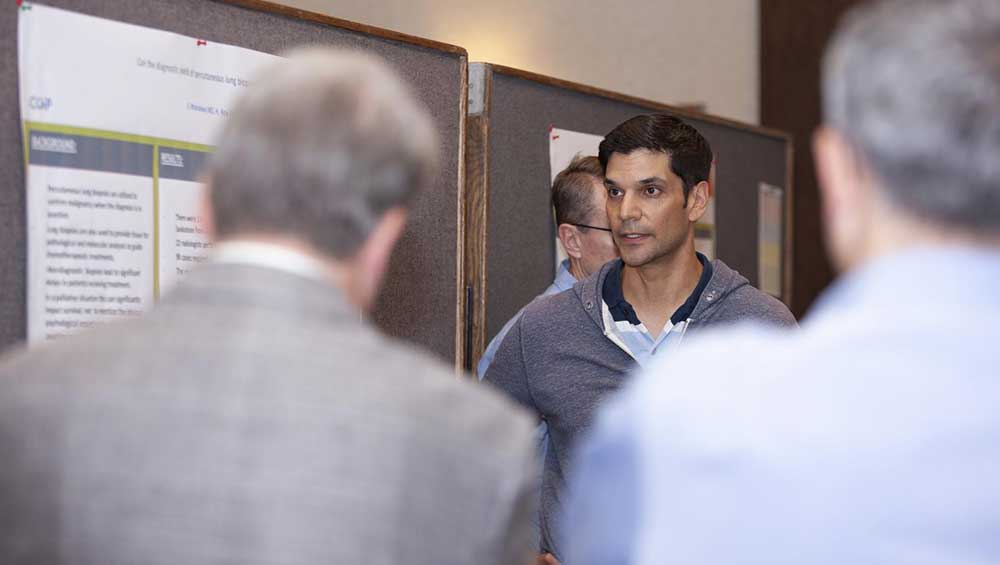
Dr. Bharadwaj’s Quality Improvement Project
Can the diagnostic yield of percutaneous lung biopsies be improved?
For his CQIP project, Dr. Bharadwaj aimed to: 1) review the rate of non-diagnostic lung biopsies in Saskatoon over the last 5 years; 2) determine what factors may contribute to a non-diagnostic specimen including target size, location, presence of necrosis, core number and sizes; and, 3) determine what factors may contribute to a non-diagnostic specimen including target size, location, presence of necrosis, core number and sizes.
Dr. Bharadwaj’s QI Learning(s)
“If it is harder than it looks (which it always is), it just means that it is probably worth doing.
Dictating from the top will not lead to sustained change. It will only create animosity if key players at all levels are not included.”
Check out Dr. Bharadwaj’s QIck talk video and project poster.
Dr. Gordon Craib, family physician, Battlefords
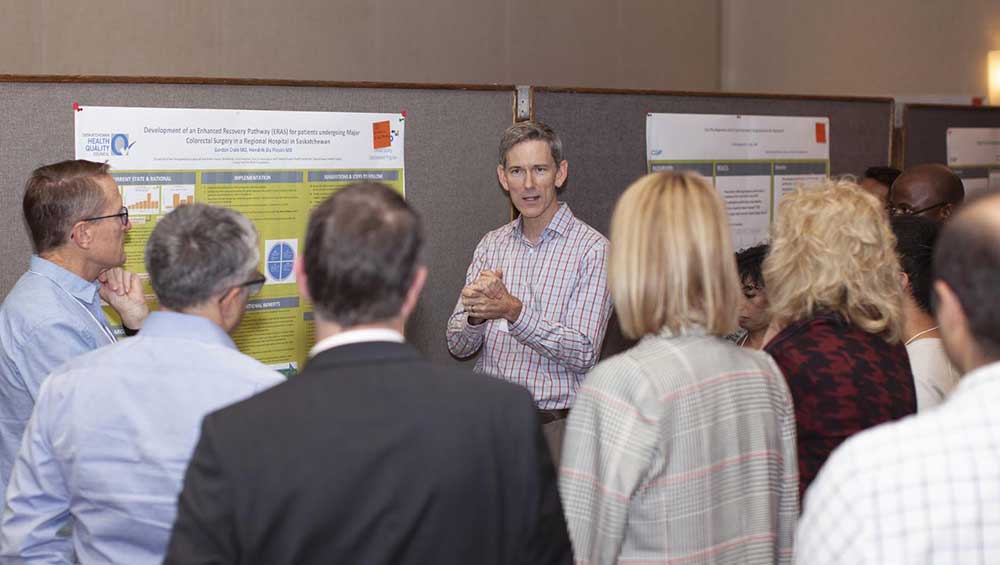
Dr. Craib’s Quality Improvement Project
Development of an Enhanced Recovery Pathway (ERAS) for Patients Undergoing Major Colorectal Surgery in a Regional Hospital in Saskatchewan
For his CQIP project, Dr. Craib aimed for consistent implementation of components of Enhanced Recovery After COLORECTAL Surgery in BUH; revised colorectal surgery ERAS pathway for BUH formalized in order sets by end of September 2018; and, loop closed in terms of educating all providers of care within the team how the changes in care will affect them but more importantly, the patient.
Dr. Craib’s QI Learning(s)
“QI is a science. But it’s not just a science, it’s an art. It’s not just about data and collecting data and doing multiple PDSA cycles and refining your process over time. If you think you can change the system on your own, nothing is going to change. The art together with the science is learning how to collaborate with people, drawing people into your project and making them a part of the team to achieve your objective. ”
Check out Dr. Craib’s QIck talk video and project poster.
Dr. Eileen Dahl, family physician, Saskatoon
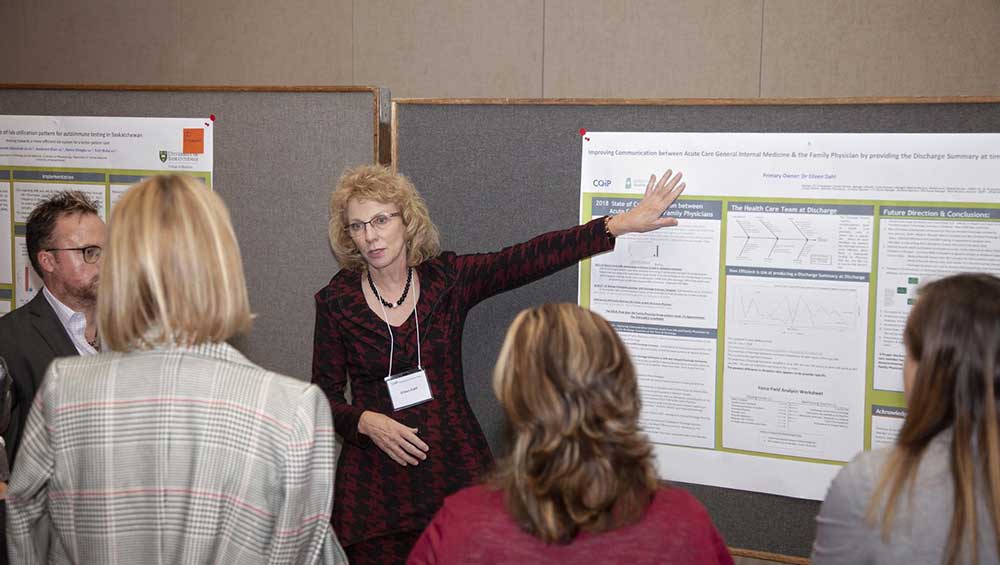
Dr. Dahl’s Quality Improvement Project
Improving Communication between Acute Care General Internal Medicine and the Family Physician by providing the Discharge Summary at time of Discharge
For her CQIP project, Dr. Dahl aimed to improve communication between Acute Care General Internal Medicine and the family physicians by providing discharge summaries when patients are discharged.
Dr. Dahl’s QI Learning(s)
“A CQIP project may not end for months or years. One needs patience and tenacity to make changes to our complex medical system. In a big project involving all the GIM physicians in Saskatoon, it requires six months of data to make meaningful comparisons MD to MD.”
Check out Dr. Dahl’s QIck talk video and project poster.
Dr. Pouneh Dokouhaki, pathologist, Saskatoon
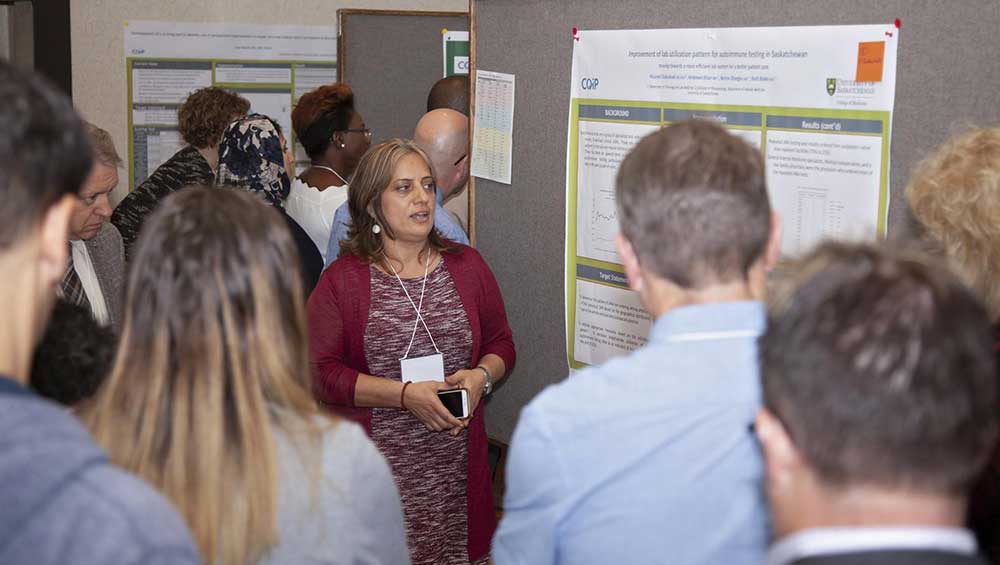
Dr. Dokouhaki’s Project
Improvement of Lab Utilization Pattern for Autoimmune Testing in Saskatchewan
For her CQIP project, Dr. Dokouhaki aimed to determine the pattern of ANA test ordering among physicians of the (previous) SHR based on the geographical distribution, type of the service, and specialty/subspecialty practice. Dr. Dokouhaki also aimed to employ appropriate measures based on the utilization pattern to decrease inappropriate utilization of the autoimmune testing (ANA as an indicator) at least by 50% by the end of 2019.
Dr. Dokouhaki’s QI Learning
“I realized that in clinical quality improvement, nothing is set, nothing is fixed. The only fixed part of it is the passion and commitment to make an improvement in any kind of work you do. Outcome indicators, the way you are going to do your improvement project, how you are going to do the project and the pace you are going to do the improvement basically depends on the kind of work and kind of field that you work in. So I had to really rethink and reconsider the ultimate aim of my project.”
Check out Dr. Dokouhaki’s QIck talk video and project poster.
Dr. Hendrik du Plessis, surgeon, Battlefords
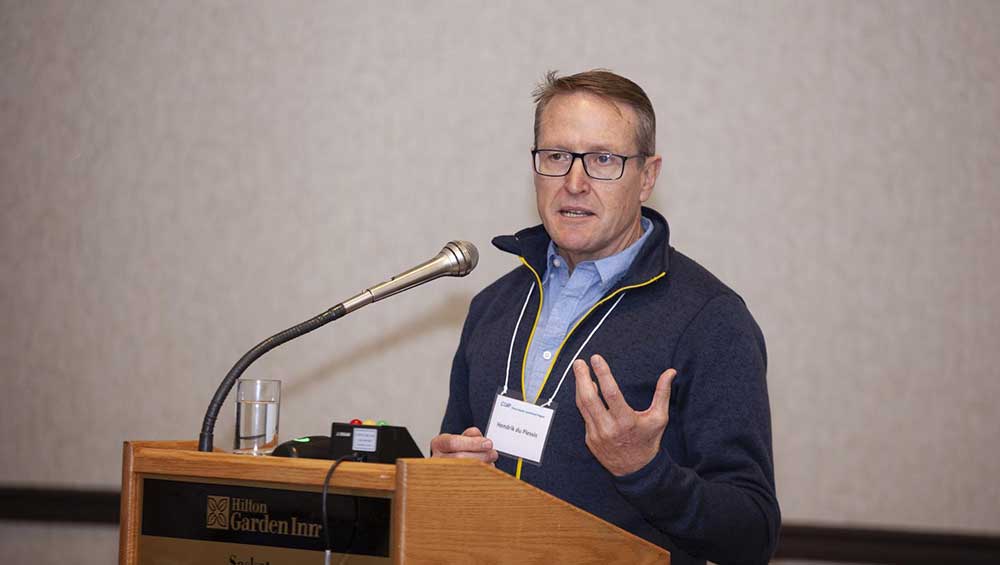
Dr. du Plessis’s Quality Improvement Project
Development of an Enhanced Recovery Pathway (ERAS) for Patients Undergoing Major Colorectal Surgery in a Regional Hospital in Saskatchewan (team project)
For his CQIP project, Dr. du Plessis aimed for consistent implementation of components of Enhanced Recovery After COLORECTAL Surgery in BUH; revised colorectal surgery ERAS pathway for BUH formalized in order sets by end of September 2018; and, loop closed in terms of educating all providers of care within the team how the changes in care will affect them but more importantly, the patient.
Dr. du Plessis’s QI Learning(s)
“I never expected to get the amount of support that I did from my co-learners and staff members and from my own colleagues. Most of all I learned from my patients because I would run these ideas them and they would give me their feedback.
I also didn’t expect how easy it would be to get people to be involved in a project like this. We were able to assemble a large supporting group from pharmacy, nursing, physiotherapy, and dietitians. I didn’t think it would be so easy to get their input, learn from them, and implement what we learn from CQIP and bring it forward to them.”
Check out Dr. du Plessis’s QIck talk video and project poster.
Dr. Randall Friesen, surgeon, Prince Albert
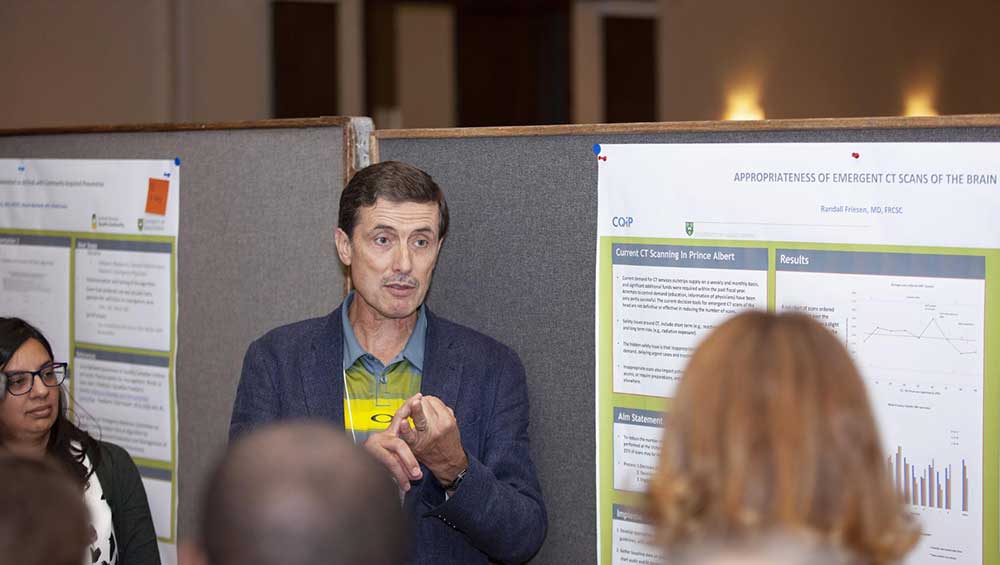
Dr. Friesen’s Quality Improvement Project
Appropriateness of Emergent CT Scans of the Brain
For his CQIP project, Dr. Friesen aimed to reduce the number of inappropriate emergent CT scans of the brain performed at the Victoria Hospital by 50% by September 2018.
Dr. Friesen’s QI Learning(s)
“I was shocked to learn that we were to do self-reflection at these sessions. I found that self-reflection, as it is in our personal lives, can help us discover what our real purpose is and light the fires of motivation and keep us going through the tough times. So thank you even for those moments.
I am very grateful that I encountered this culture of curiosity, an atmosphere of safety, and an abiding focus on the reason why we are here, which is our patients.”
Check out Dr. Friesen’s QIck talk video and project poster.
Dr. Ayisha Kurji, general pediatrician, Saskatoon
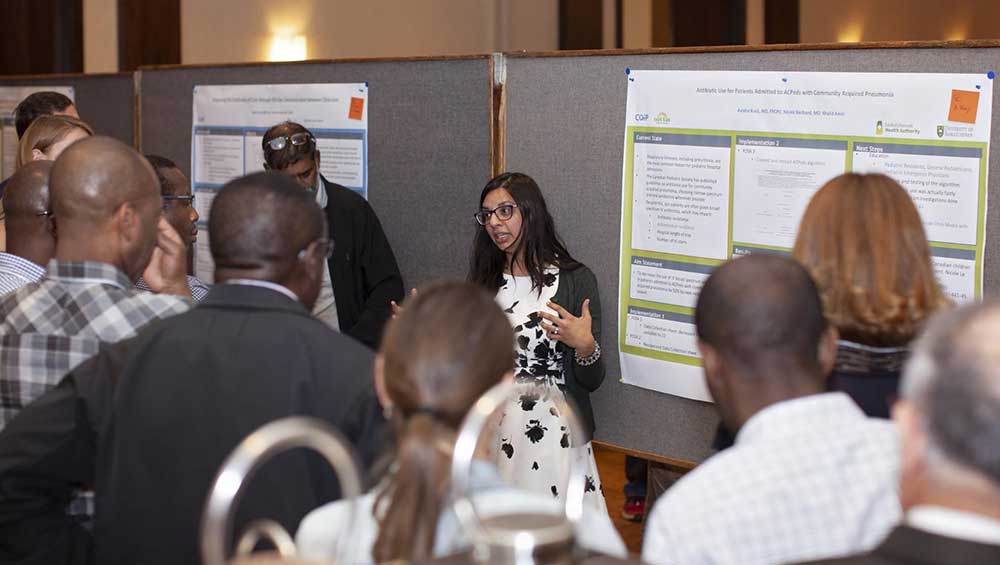
Dr. Kurji’s Quality Improvement Project
Antibiotic Use for Patients Admitted to ACPeds with Community-Acquired Pneumonia
For her CQIP project, Dr. Kurji aimed to decrease the use of IV broad-spectrum antibiotics in patients admitted to ACPeds with community-acquired pneumonia by 50%.
Dr. Kurji’s QI Learning(s)
“One of the biggest things for CQIP for me has been the importance of a team. I’m really used to working in a team clinically, but for QI I hadn’t really realized that there are other people out there who will help you and who want to and are as passionate about change as you are.
You don’t have to have all the answers by yourself and you don’t have to have a solution to the problem right away before you start a project. In fact, sometimes it is better to have an idea and bring other people in because you will be forced to look at things in a creative way, you’ll maybe find solutions that you didn’t think that were possible or part of your success and it will be a lot more enjoyable when you work together and you don’t have to carry all that weight by yourself.”
Check out Dr. Kurji’s QIck talk video and project poster.
Sarah Lynds, pharmacist, Battlefords
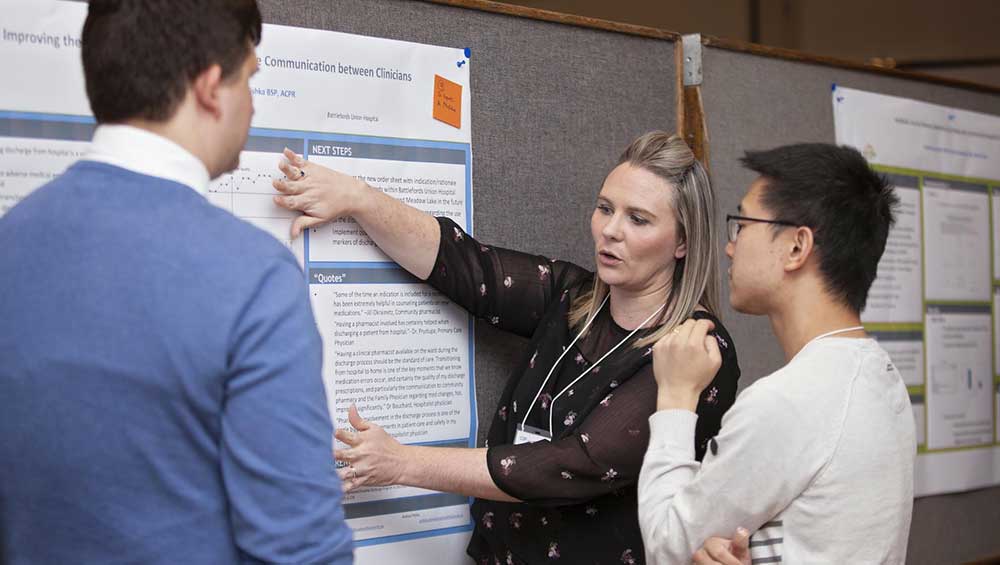
Sarah’s Quality Improvement Project
Improving the Continuity of Care through Effective Communication between Clinicians
For her CQIP project, Sarah aimed to improve communication between the interdisciplinary hospital team and the primary care team regarding the hospital stay, as well as to improve the quality and timeliness of discharge summaries.
Sarah’s QI Learning(s)
“I was really surprised by including patient family advocates in our conversations, the perspective they had that we hadn’t even considered. I think that moving forward in even the smaller QI things you do on a day-to-day basis, taking the opportunity to talk to patients in hospital, in your practice to get that perspective is really important and always bringing it back to the patient.”
Bonus: Check out Sarah’s QIck talk video and project poster.
Dr. Dapo Mabadeje, surgeon, Prince Albert
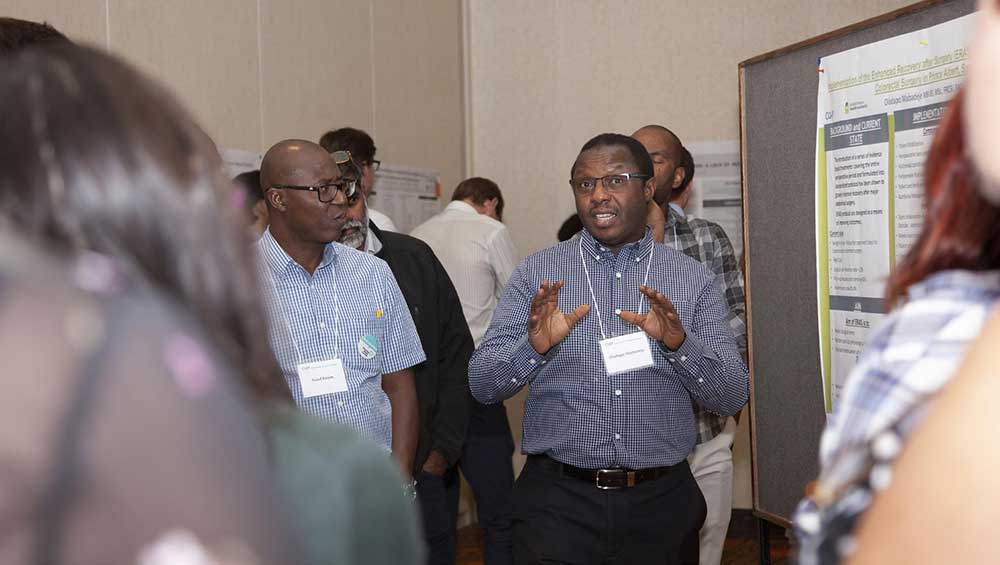
Dr. Mabadeje’s Quality Improvement Project
Implementation of the Enhanced Recovery after Surgery (ERAS) Program in patients undergoing Colorectal Surgery in Prince Albert, Saskatchewan
For his CQIP project, Dr. Mabadeje aimed to reduce surgical stress, maintain post-op physiological function, enhance mobilization after surgery, reduce rates of morbidity, and shorten recovery and lengths of stay in hospital.
Dr. Mabadeje’s QI Learning(s)
“The fishbone diagram is a great tool. It helped me to break down my project into easily manageable bits and what felt like a very complex path became simple to achieve. And, it’s very important to get the patient’s perspective. Most QI projects are focused on patient care. If you don’t get the patient perspective, you tend to do things based on your own assumptions. We have not walked in the patient’s shoes.
Also, teamwork is very important: you must collaborate. You should know your team. When things get difficult, just remember that persistence trumps failure. CQIP is a journey: mine is just starting.”
Check out Dr. Mabadeje’s QIck talk video and project poster.
Dr. Beth Machnee, family physician, Yorkton
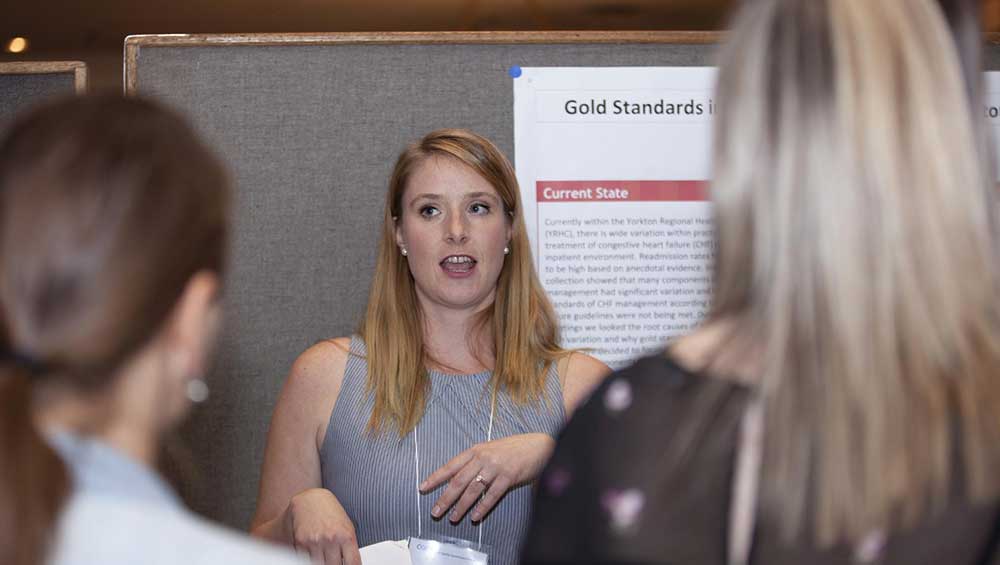
Dr. Machnee’s Quality Improvement Project
Gold Standards in Heart Failure within the Yorkton Regional Health Center
For her CQIP project, Dr. Machnee aimed to decrease admissions to Yorkton Regional Health Centre for congestive heart failure by reducing variability within clinical practice.
Dr. Machnee’s QI Learning(s)
“My aha moments:
1. Some practises in medicine are better standardised and not left to physician preference. This decreases the stress load on physicians and helps them make better decisions.
2. What I think is the root cause of a problem is probably not the root cause. There are likely many contributing factors, which is why it’s important to do your driver diagram and root cause analysis.
3. Variation in clinical practise can bring more harm than good.
4. The Why Statement – it is important to involve your team in defining the “why” for the project so everyone can be passionate about it.”
Check out Dr. Machnee’s QIck talk video and project poster.
Dr. Kyle Moulton, radiologist, Saskatoon
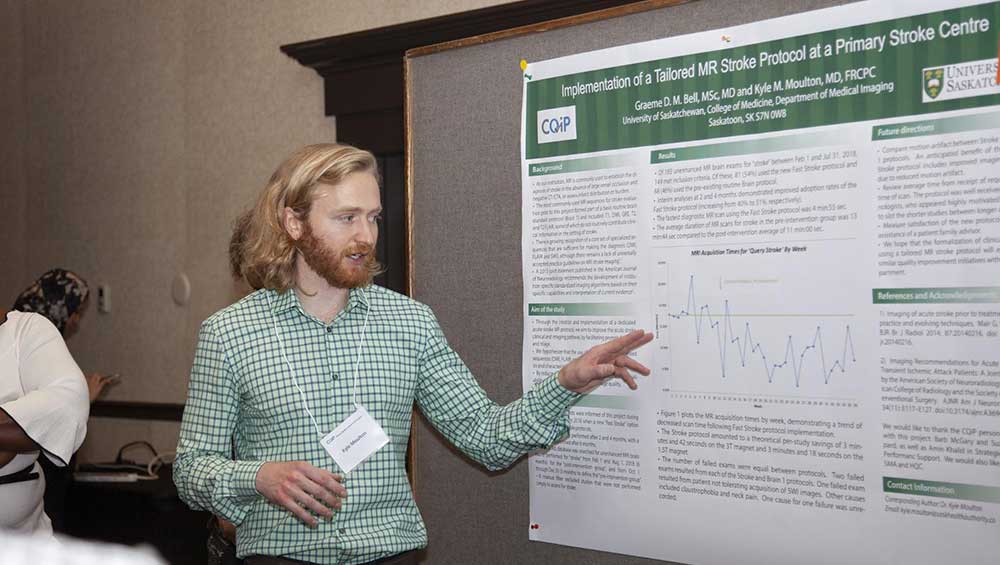
Dr. Moulton’s Quality Improvement Project
Implementation of a Tailored MR Stroke Protocol at a Primary Stroke Centre
For his CQIP project, Dr. Moulton aimed to improve the acute stroke clinical and imaging pathway by facilitating prompt diagnosis and triage by creating and implementing a dedicated acute stroke MR protocol.
Dr. Moulton’s QI Learning(s)
“The program gave me a new QI philosophy to work with. By learning the language and the conceptual framework of QI in a formal setting, I could actually look at these QI problems and what would otherwise be incomprehensible is now understandable and attackable.”
Check out Dr. Moulton’s QIck talk video and project poster.
Dr. Shadé Onaolapo, Head of Dept. of Anesthesia, Yorkton
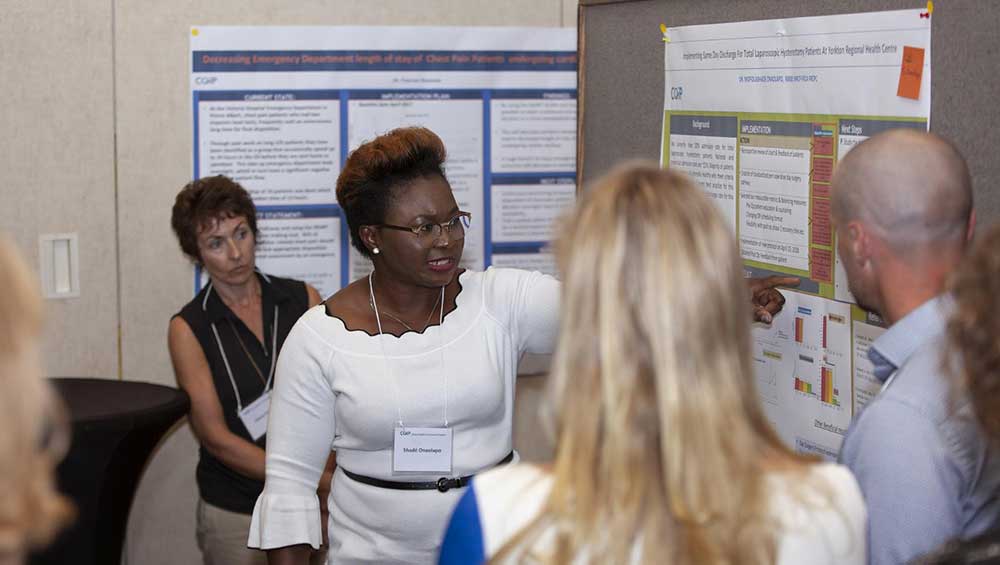
Dr. Onaolapo’s Quality Improvement Project
Implementing Same Day Discharge For Total Laparoscopic Hysterectomy Patients At Yorkton Regional Health Centre
For her CQIP project, Dr. Onaolapo aimed to study the barriers to implementing same-day discharge for total laparoscopic hysterectomy patients with the goal of reducing the admission rate of TLH patients by 75% by March 31, 2019.
Dr. Onaolapo’s QI Learning(s)
“Quality improvement is not a straight line; it’s a winding road. My project A3 form helped me get my bearings; I returned to it many times. The fishbone tool and 5 Whys tool are useful for engaging others.
My overall learning is reflected in the African proverb: It takes a village to raise a child. I could not have done anything without the support of a team. ”
Check out Dr. Onaolapo’s QIck talk video and project poster.
Andrew Plishka, pharmacist, Battlefords
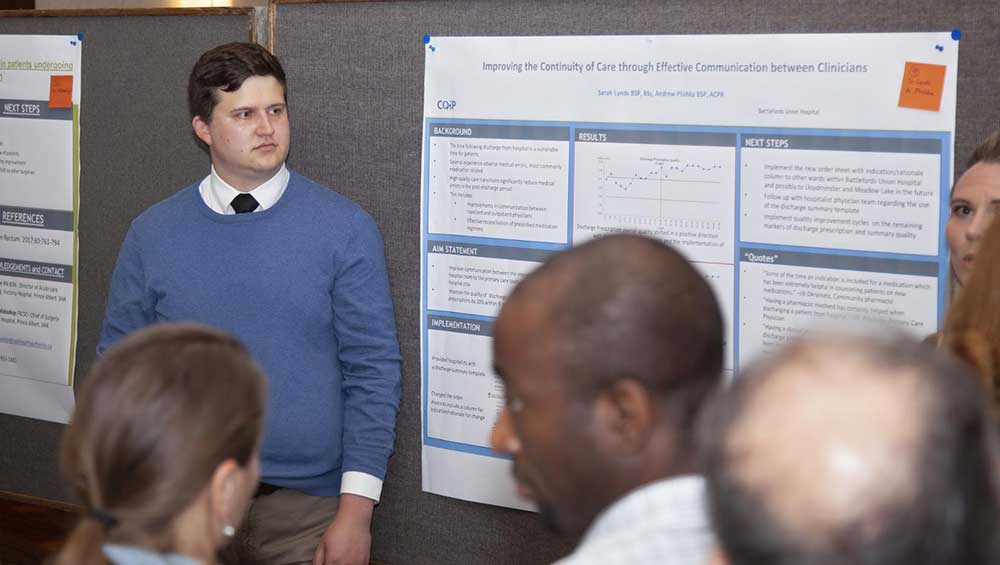
Andrew’s Quality Improvement Project
Improving the Continuity of Care through Effective Communication between Clinicians
For his CQIP project, Andrew aimed to improve communication between the interdisciplinary hospital team and the primary care team regarding the hospital stay, as well as to improve the quality and timeliness of discharge summaries.
Andrew’s QI Learning
“I now have a level of confidence going forward to implement future projects. It was surprising to me how the principles we were taught span such a wide spectrum from your personal life, to a department, to a hospital, or larger kind of organization.
When approaching my project I kind of thought – hey, we have an idea and we’ll just talk to people about it and it will be implemented the next day. Obviously, that doesn’t happen and once I realized that I had my first big breakthrough. My big a-ha moment, though, was seeing how important teams are and how well they can actually facilitate that change. ”
Check out Dr. Mabadeje’s QIck talk video and project poster.
Dr. Lexy Regush, obstetrics & gynaecology, Saskatoon
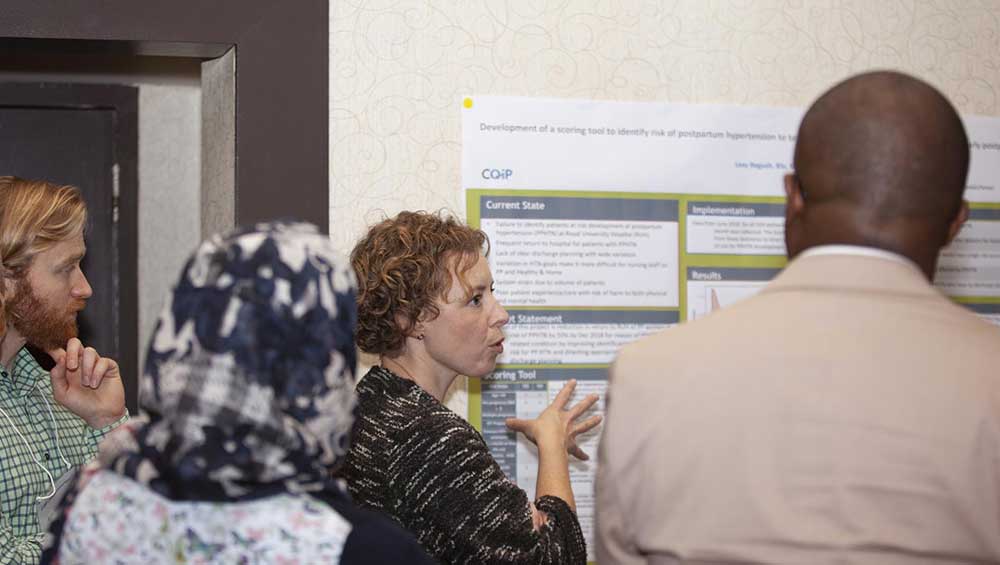
Dr. Regush’s Quality Improvement Project
Development of a Scoring Tool to Identify Risk of Postpartum Hypertension to Target Care and Reduce Return to Hospital in the Early Postpartum Period
For her CQIP project, Dr. Regush aimed to reduce the number of postpartum women returning to hospital for hypertension or related conditions.
Dr. Regush’s QI Learning(s)
“My key learnings:
- What you think is a problem probably is, but what you think the source is may not be correct.
- In a complex system, solutions are best arrived at by a team. Everyone knows a piece of the right answer, but without engaging these people you will probably not succeed and you probably won’t arrive at the right conclusions. Persnickety team members are important team members. They make it difficult at times; however, if you can satisfy their concerns, your project will likely be successful.
- Data collection can be tough, so get help with it where you can. There are people who know more than you do, and people who know what to do with the data. Without a plan, data collection can be overwhelming.
- Where you can’t use health records data, you will need to come up with creative solutions.
- Everyone on the team needs to know what’s in it for them, despite the noble goals of the project.
- You must pay attention to the balancing measures.
- Physician involvement and leadership is important.
- Patients keep you on track and are an important part of your team.”
Check out Dr. Regush’s QIck talk video and project poster.
Dr. Olivia Reis, family physician, Regina
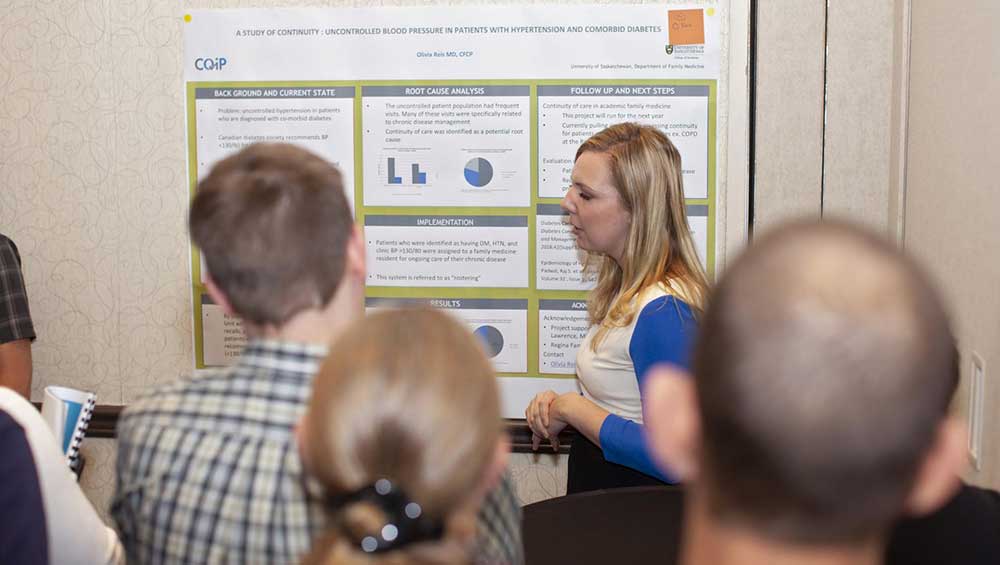
Dr. Reis’s Quality Improvement Project
A Study of Continuity: Uncontrolled Blood Pressure in Patients with Hypertension and Co-Morbid Diabetes
For her CQIP project, Dr. Reis aimed to implement a pathway at the Regina Family Medicine Unit to ensure patients with diabetes are within the recommended target for blood pressure control (<130/80).
Dr. Reis’s QI Learning(s)
“The biggest a-ha for me was a shift in how I look at and approach a problem. Before CQIP, I tended to approach a problem with a solution already in mind. Our first learning focused on the importance of first understanding the problem, then truly understanding why the problem exists – which will help identify change ideas. I also learned that when you’re trying to make change in a complex system you need to engage with others to try to untangle the issues contributing to your central problem.”
Bonus: Check out Dr. Reis’s QIck talk video and project poster.
Dr. Francois Rossouw, emergency physician, Prince Albert
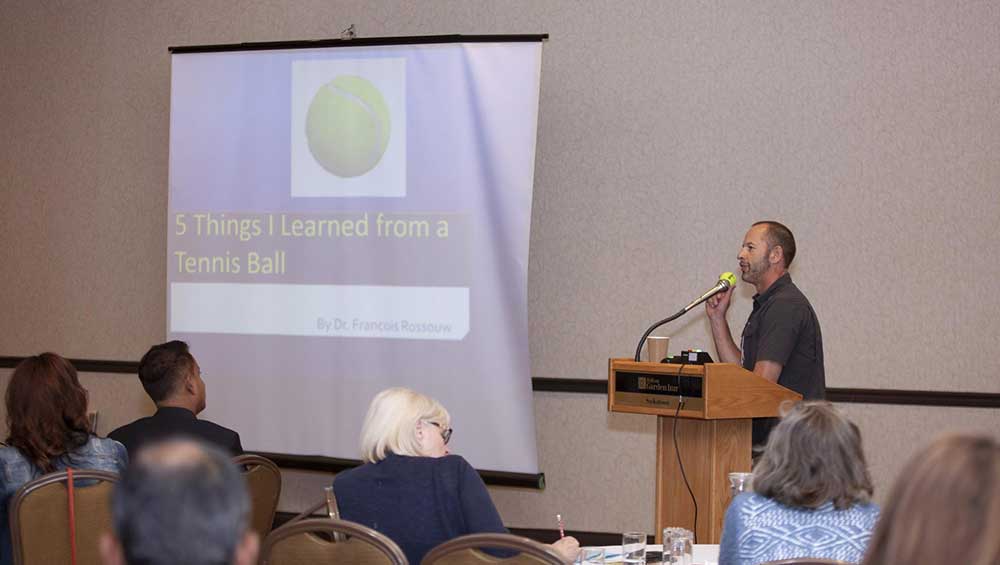
Dr. Rossouw’s Quality Improvement Project
Decreasing Emergency Department Length of Stay of Chest Pain Patients Undergoing Cardiac Workup
For his CQIP project, Dr. Rossouw aimed to follow the Heart Pathway and use the HEART SCORE as a clinical decision-making tool so that patients with possible cardiac-related chest pain are managed appropriately.
Dr. Roussow’s QI Learning(s)
“The five things that I Iearned:
- You need to take the lead in improvement, using the right tools, creating the right circumstances to support good quality patient care.
- Variation: We need to decrease variation in medical practise.
- Assumptions can be deceiving and are often wrong.
- Teamwork: Work with a team or you’ll suffer alone. Involve the people who you want to influence on your team.
- Safe environment: With QI, you want to encourage success, rather than treat it as performance measurement or management.”
Check out Dr. Rossouw’s QIck talk video and project poster.
Dr. Christine Ryan, family physician, Shellbrook
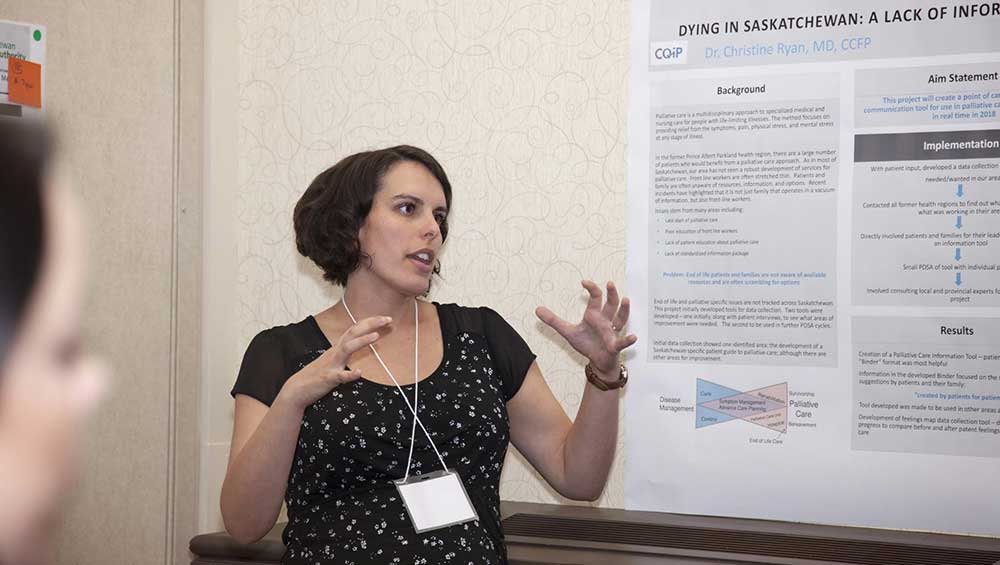
Dr. Regush’s Quality Improvement Project
Dying in Saskatchewan: A Lack of Information around Palliative Care
For her CQIP project, Dr. Ryan aimed to create a communication tool for use in palliative care.
Dr. Ryan’s QI Learning(s)
“My learnings: I changed the way I present project ideas. Some people need to see the data. Others are more affected by a specific patient story and that’s what motivates them to help you with the change. In QI it’s important to listen to your critics or skeptics, as they may actually be change agents. In our project, some of them actually ended up being major contributors. I changed my approach to asking patients what they want, and used “humble inquiry” and worked on my own attitudes to ensure I’m not defensive in my interactions. I also learned to start using driver diagrams and run charts earlier on in an improvement project, rather than just at the end for presentation purposes; I found this actually changed my framework for thinking about a project.”
Bonus: Check out Ryan’s QIck talk video and project poster.
Dr. Anderson Tyan, respirologist, Saskatoon
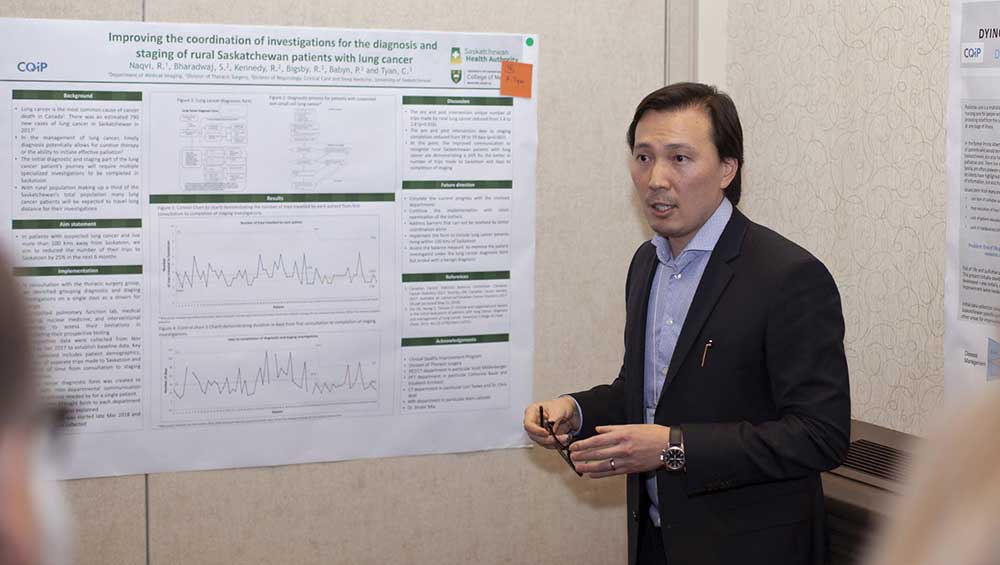
Dr. Tyan’s Project
Improving the Coordination of Investigations for the Diagnosis and Staging of Lung Cancer in Rural Patients
For his project, Dr. Tyan aimed to reduce by 25% the number of trips to Saskatoon by patients with suspected lung cancer who live more than 100 kms away.
Dr. Tyan’s QI Learning(s)
“QI is both art and science. It’s about working with people, creating community… sharing ideas and then taking an idea to action and testing it. Learning about value stream maps helped me to see the bigger picture. Once you see how things flow, you can focus on specific drivers for change. I also learned how to use statistical tools (run charts, control charts) to determine whether the changes we’re making are significant. I wasn’t used to asking for help, but CQIP helped me reframe things in terms of who I’m asking for help for – the patient – and why I’m asking for help – to improve the quality of care. That made it easy to get support from my colleagues. I also learned it’s important to scale your improvement project to something that’s doable.”
Check out Dr. Tyan’s QIck talk video and project poster.
Dr. Kevin Wasko, emergency physician, Swift Current, and Physician Executive of Integrated Rural Health, Saskatchewan Health Authority
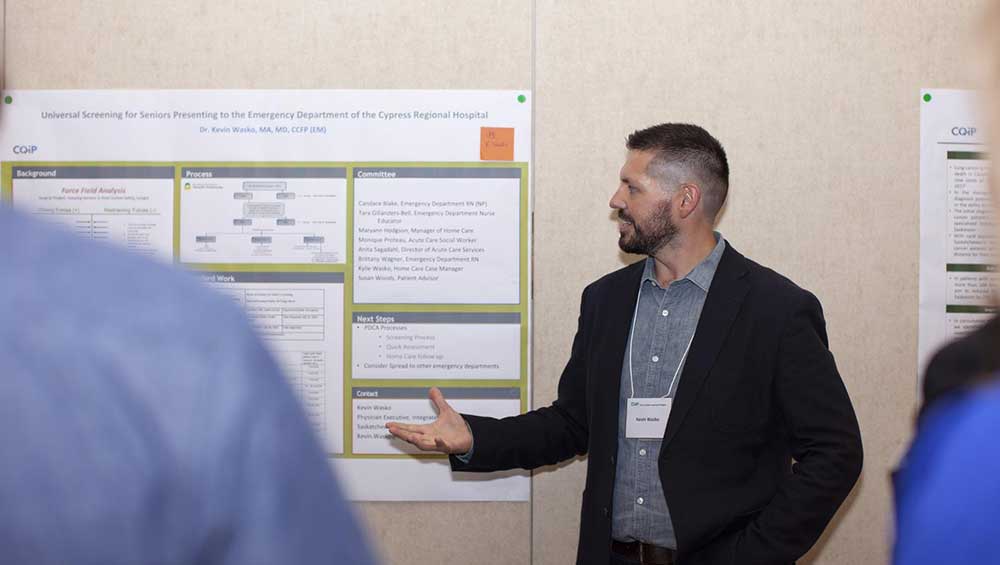
Dr. Wasko’s Project
Universal Screening for Seniors Presenting to the Emergency Department of the Cypress Regional Hospital
For his CQIP project, Dr. Wasko aimed to have seniors living safely in their homes longer.
Dr. Wasko’s QI Learning(s)
“By continually using the concepts, the QI lingo became second nature. The tools I learned became useful and applicable in multiple settings. We can use the tools both clinically and in our home lives. More was gained through the learning and the workshops and the application than the project itself. The project was a means to an end, not the end. QI has its own language. My a-ha moment was achieving fluency in that language. I’m now inclined to use the tools when I work through problems. Change is difficult. That was reinforced; it does take dedicated, concerted, focused effort.”
Check out Dr. Wasko’s QIck talk video and project poster.
Dr. Scott Willms, orthopaedic surgery resident, Saskatoon
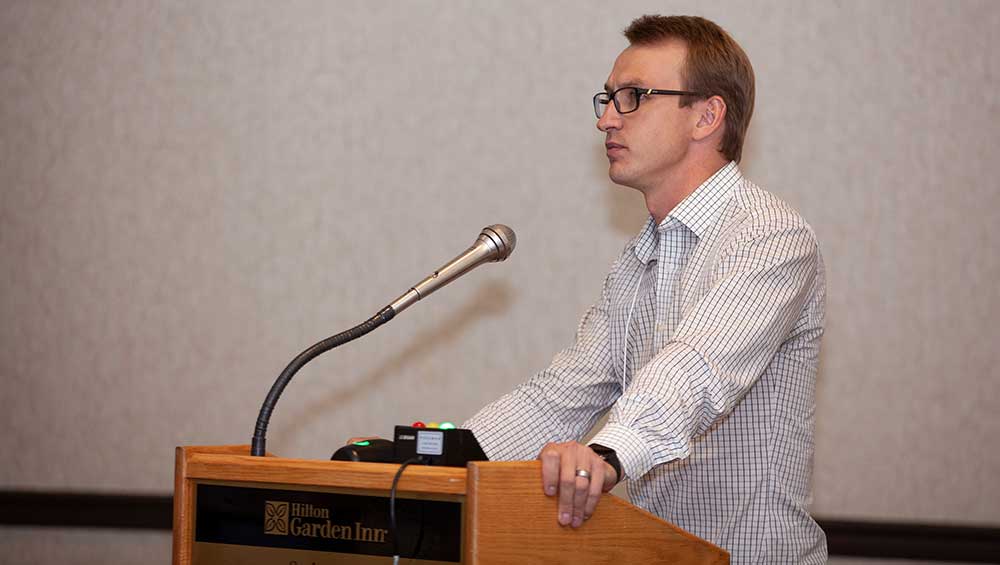
Dr. Willm’s Project
Changes in Discharge Practices and the Effects on Osteoporosis Management in Post Fragility Hip Fracture Patients: A Quality Improvement Study For his CQIP project, Dr. Willms aimed to increase the percentage of patients aged 50 and older who sustain a fragility hip fracture that begin anti-osteoporotic treatment, and establish a fracture liaison service (FLS) in Saskatoon to evaluate all patients who sustain a fragility fracture.
Dr. Willm’s QI Learning(s)
“It’s important to learn the knowledge behind QI. You need to be able to talk to people and demonstrate the concepts. This knowledge enables you to correctly analyze the problem then solve it. You don’t necessarily need to be at the top of the totem pole to lead change. And your passion for your project really matters. You have to be excited about what you’re doing and you have to demonstrate that to other people so they will latch on to your ideas.”
Check out Dr. Willm’s QIck talk video and project poster.
Thanks for the insights, cohort two! On behalf of the CQIP team, it was a pleasure working with you. 🙂 Also a big thanks to our partners, the SMA and the Ministry of Health, together we are helping grow great quality improvement mindsets within our province. And, last but not least, a huge thank you to I Spy Imagery for taking great images of the day!
Are you Saskatchewan’s next clinical quality improvement champion?
CQIP is geared to actively practising health care clinicians from all areas of Saskatchewan who are currently working in a clinical context. CQIP training is designed for all care settings — including long-term, community, acute, and primary care. Physicians may be eligible for CME credits for their participation in CQIP. Make positive change and take your QI leadership skills to the next level!
Applications for Cohort 4 will open soon. You can sign up here to be notified when applications packages are available. If you have questions about the program, visit the CQIP web page or contact the CQIP team at cqip@hqc.sk.ca.

